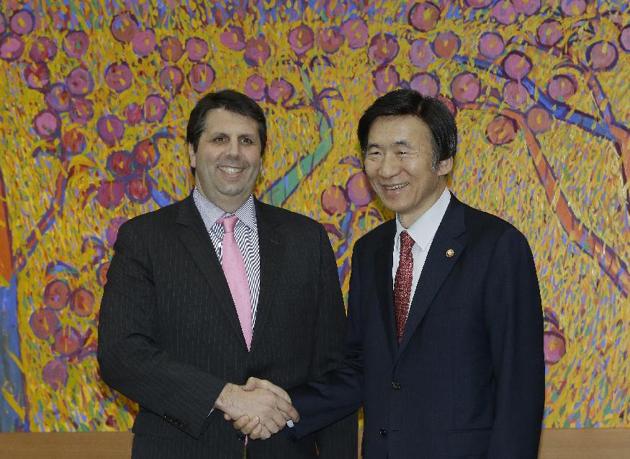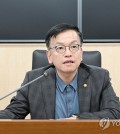- California Assembly OKs highest minimum wage in nation
- S. Korea unveils first graphic cigarette warnings
- US joins with South Korea, Japan in bid to deter North Korea
- LPGA golfer Chun In-gee finally back in action
- S. Korea won’t be top seed in final World Cup qualification round
- US men’s soccer misses 2nd straight Olympics
- US back on track in qualifying with 4-0 win over Guatemala
- High-intensity workout injuries spawn cottage industry
- CDC expands range of Zika mosquitoes into parts of Northeast
- Who knew? ‘The Walking Dead’ is helping families connect
US wants Abe to reaffirm key apologies

U.S. Ambassador to South Korea Mark Lippert, left, shakes hands with South Korean Foreign Minister Yun Byung-se during a meeting at the Foreign Ministry in Seoul, South Korea. Lippert was appointed to the post in May and was confirmed by the Senate last month. (AP Photo/Ahn Young-joon)
By Yi Whan-woo
The United States backs Japan’s two landmark apologies on its wartime atrocities and aggression amid Tokyo’s move to change wordings of the 1995 Murayama Statement, according to Washington’s top envoy to Seoul, Tuesday.
“We in the U.S. continue to have expressed support for the Kono and Murayama statements and continue to believe that those are important statements that undergird this issue,” U.S. Ambassador to South Korea Mark Lippert said in an interview with reporters at his residence in Seoul.
Lippert’s remark came after Japanese Prime Shinzo Abe hinted Japan would modify the wordings of the Murayama Statement.
Named after former Japanese Prime Minister Tomiichi Murayama, it offered an apology for the colonial occupation. It has been a key element in relations between Seoul and Tokyo, together with the Kono Statement.
In a TV interview, Sunday, Abe said he may not use the wording that his predecessors repeatedly used in his statement to be released on Aug. 15 on the 70th anniversary of the end of the WWII.
His approach triggered criticism from many opposition leaders amid speculation that it would deepen disputes with East Asian countries, including South Korea and China over historical issues.
Lippert said he recognizes the need to improve frayed Seoul-Tokyo ties and enhance trilateral cooperation with the two countries and Washington.
“They’re two very important countries, and the relationship is important. We in the U.S. recognize that this is a very difficult, very tough issue.
“Our role is not to mediate, to play a formal mediation role, but to encourage two great nations with two democratically elected leaders to come to a resolution on this,” he said.











